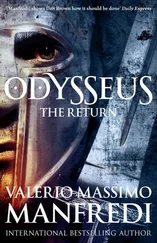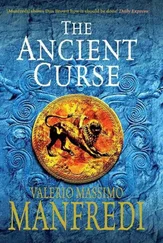Valerio Manfredi - The Ides of March
Здесь есть возможность читать онлайн «Valerio Manfredi - The Ides of March» весь текст электронной книги совершенно бесплатно (целиком полную версию без сокращений). В некоторых случаях можно слушать аудио, скачать через торрент в формате fb2 и присутствует краткое содержание. Жанр: Исторические приключения, на английском языке. Описание произведения, (предисловие) а так же отзывы посетителей доступны на портале библиотеки ЛибКат.
- Название:The Ides of March
- Автор:
- Жанр:
- Год:неизвестен
- ISBN:нет данных
- Рейтинг книги:4 / 5. Голосов: 1
-
Избранное:Добавить в избранное
- Отзывы:
-
Ваша оценка:
- 80
- 1
- 2
- 3
- 4
- 5
The Ides of March: краткое содержание, описание и аннотация
Предлагаем к чтению аннотацию, описание, краткое содержание или предисловие (зависит от того, что написал сам автор книги «The Ides of March»). Если вы не нашли необходимую информацию о книге — напишите в комментариях, мы постараемся отыскать её.
The Ides of March — читать онлайн бесплатно полную книгу (весь текст) целиком
Ниже представлен текст книги, разбитый по страницам. Система сохранения места последней прочитанной страницы, позволяет с удобством читать онлайн бесплатно книгу «The Ides of March», без необходимости каждый раз заново искать на чём Вы остановились. Поставьте закладку, и сможете в любой момент перейти на страницу, на которой закончили чтение.
Интервал:
Закладка:
Casca breathed a sigh of relief and regained sufficient control to send the senator on his way with some sharp words: ‘I won’t accept such insinuations. My behaviour has always been beyond reproach.’
Brutus had approached Cassius and was quietly conversing with him when Popilius Laenas, one of the oldest of the venerable assembly, came up to them with a cordial expression. He took them aside and said in a rather loud whisper, ‘I wish you luck in completing your plan. But act quickly. Something of this sort won’t stay a secret long.’
Having said this, he walked away quickly, leaving Brutus and Cassius stunned.
Did Popilius know? And, if he did, how many others? In the meantime, Caesar was already crossing the threshold and walking into the room. Popilius walked up to him as Brutus watched in horror.
‘Look!’ he said to Cassius. ‘He’s approaching Caesar. . It’s over, my friend. We must ready ourselves to die an honourable death. May our blood be on the head of the tyrant! Pass word on to the others.’
With that, he grasped the hilt of the dagger under his cloak. Cassius then spoke quietly to Pontius Aquila, who was standing nearby, and he turned to Rubrius Ruga and to Caius Casca.
Popilius Laenas began to chat with Caesar in a free and easy way, and the two men conversed for a while without paying attention to anyone else. No one could hear what they were saying.
The conspirators, who had all been alerted by word of mouth, seized their daggers and moved towards the companion with whom they’d exchanged the death oath.
But nothing happened.
Popilius had the air of requesting, rather than revealing, something. He kissed Caesar’s hand and was answered with what seemed to be reassuring words.
Brutus cast a soothing look around the room and gave a nod as if to say that their panic had been unnecessary. They all calmed down.
Just then an out-of-breath messenger came asking for Brutus. He caught a glimpse of him, ran over and bent close, still panting, trying to control his emotions.
‘Your wife, master, lady Porcia. .’
‘Speak up, what’s wrong?’
‘She’s fallen ill, or perhaps. .’
‘What?’ insisted Brutus, grabbing him by the tunic.
‘Perhaps she’s dead,’ replied the servant, and took to his heels.
Brutus dropped his head in confusion and anguish. He knew he should go to Porcia, but he couldn’t desert his friends at this moment. No matter how events unfolded, this would be a tragic day for him. Cassius laid a hand on his shoulder.
Caesar went then to his golden chair.
A brief exchange of glances between Cassius and Tillius Cimber was their cue. The plan could go ahead.
Cimber approached Caesar.
‘What is it, Cimber?’ he asked with a touch of impatience. ‘It’s not about recalling your brother from exile again, is it? You know what I think about that and I haven’t changed my mind.’
‘But Caesar,’ began Cimber, ‘I beg of you. .’ In saying this, he grasped Caesar’s toga, which slipped off his shoulders.
This was the second and final signal. Casca stood behind Caesar and dealt the first blow.
Caesar bellowed out in pain and surprise.
The roar of the wounded lion thundered in the hall and outside of it.
He shouted, ‘This is violence!’ and before the dagger could strike him again he twisted around, stylus in fist, ready to plunge it into his assailant’s arm. Casca’s hand trembled and the second cut was only skin deep. But there was no escaping the daggers that surrounded Caesar now, everywhere he turned.
The entire Senate was afire with shouts and cries. Someone called out Cicero’s name.
Absent.
Outside, Antony turned instinctively towards the door, but Caius Trebonius’s hand nailed him to the wall.
‘Don’t. It’s all over by now.’
Antony pulled away from him and fled.
Caius Trebonius took his own dagger in hand and entered.
Caesar was still trying to defend himself, but they were all upon him. He was struck by Pontius Aquila, then Cassius Longinus, Casca again and Cimber, Ruga and Trebonius himself. .
Each of them wanted to sink his dagger into Caesar’s flesh and they ended up hindering — even wounding — each other. Caesar was writhing about furiously, still roaring and spouting blood from his wounds. His garments had turned red and a vermilion pool was widening at his feet. With each move he made, the conspirators closed in further, slashing at him as at an animal caught in a trap. The more their victim became incapable of defending himself or even moving, the more their ferocity grew.
A last stab from Marcus Junius Brutus.
To the groin.
Caesar whispered something, looked him in the eye and gave up.
He pulled his toga over his head then, like a shroud, in a final attempt to save his dignity, and collapsed at the feet of Pompey’s statue.
The conspirators raised their bloody daggers high, shouting, ‘The tyrant is dead! You are free!’
But the senators were scrambling to get out, overturning their chairs and seeking a way to escape.
The few who remained, most of them part of the conspiracy, followed Cassius and Brutus through the city streets towards the Capitol, shouting to the odd frightened bystander, ‘You’re free! Romans, we have set you free!’
No one dared join them. Doors and window were bolted shut and shops were closed. Shock and panic spread.
An old beggar glanced up with rheumy eyes, his skin pink with scabies. It made no difference to him.
Romae, in Curia Pompeii, Id. Mart., hora sexta
Rome, Pompey’s Curia, 15 March, eleven a.m.
Publius Sextius rode up at a gallop and leapt to the ground in front of the Curia stair. A trickle of blood came from the hall.
His heart contracted in his chest.
He walked up the steps one by one, certain of what had already happened, overwhelmed by a sense of infinite despair.
All his efforts had been in vain.
He took in the scene at once: Caesar’s disfigured body, his garments heavy with blood; the impassive expression of Pompey’s statue.
Silence. A bloody silence.
From behind the pedestal appeared Antistius, who had recognized him. His eyes were full of terror and tears.
‘Help me,’ he said.
Three of the four litter-bearers entered then, carrying the folding stretcher that was always kept inside the litter, in keeping with Antistius’s instructions. They set it on the floor.
Publius Sextius lifted the corpse by the shoulders and eased it on to the stretcher, as Antistius took the feet. They covered it as best they could with Caesar’s blood-soaked toga.
The litter-bearers then raised the makeshift bier and walked towards the exit.
Publius Sextius unsheathed his sword and thrust it into the air. He stiffened in a final salute to his commander as he was taken out of the Senate hall. At that same moment Caesar’s arm slipped from the stretcher and dangled in the air, swaying with every movement the bearers made. And that was the last image impressed on the mind of Publius Sextius, known as ‘the Cane’: the arm that had conquered the Celts and the Germans, the Hispanics and the Pontians, the Africans and the Egyptians, hanging limply from a lifeless body.
Viae Cassiae, ad VIII lapidem, Id. Mart, hora decima
The Via Cassia, eight miles from Rome, 15 March, three p.m.
Rufus careered into the station at the eighth milestone, having pushed his steed to the limit. His destination, finally, after such a long struggle. He jumped to the ground and rushed past the two sentries, displaying his speculator badge.
‘Where is the commanding officer?’ he asked as he raced past.
‘Inside,’ replied one of the two.
Rufus entered and reported to the young decurion on duty. ‘Message from the service. Top priority and maximum urgency
Читать дальшеИнтервал:
Закладка:
Похожие книги на «The Ides of March»
Представляем Вашему вниманию похожие книги на «The Ides of March» списком для выбора. Мы отобрали схожую по названию и смыслу литературу в надежде предоставить читателям больше вариантов отыскать новые, интересные, ещё непрочитанные произведения.
Обсуждение, отзывы о книге «The Ides of March» и просто собственные мнения читателей. Оставьте ваши комментарии, напишите, что Вы думаете о произведении, его смысле или главных героях. Укажите что конкретно понравилось, а что нет, и почему Вы так считаете.












